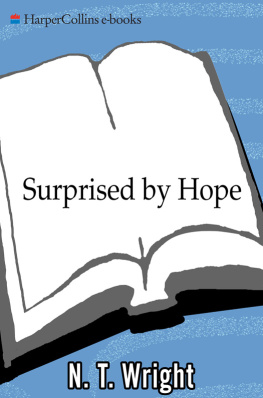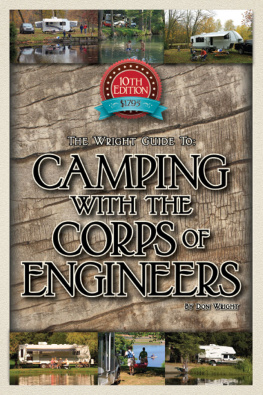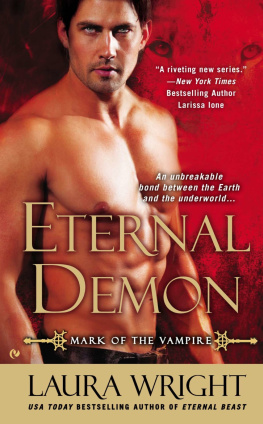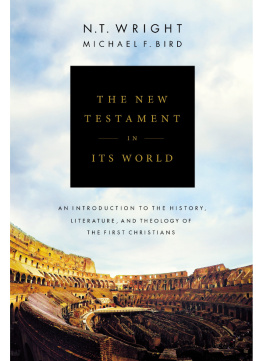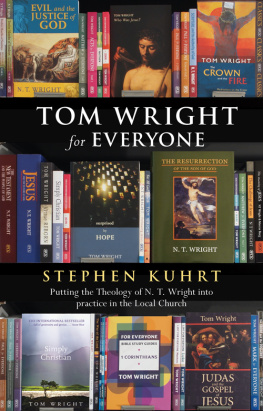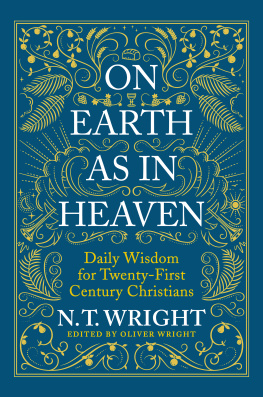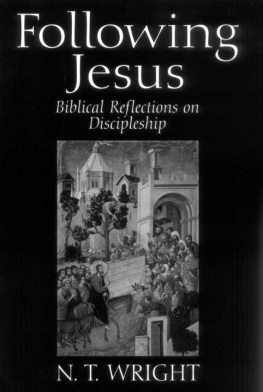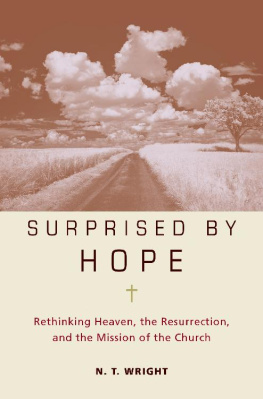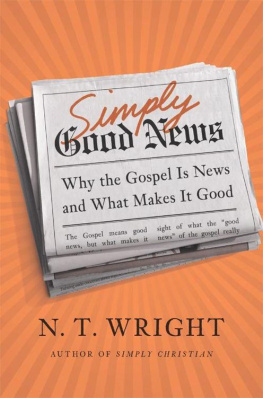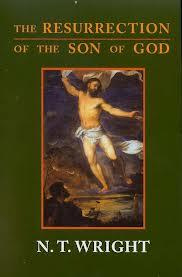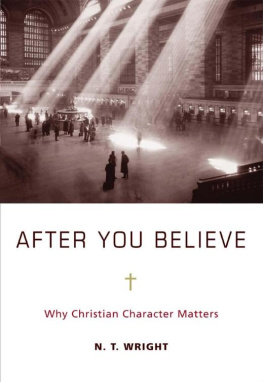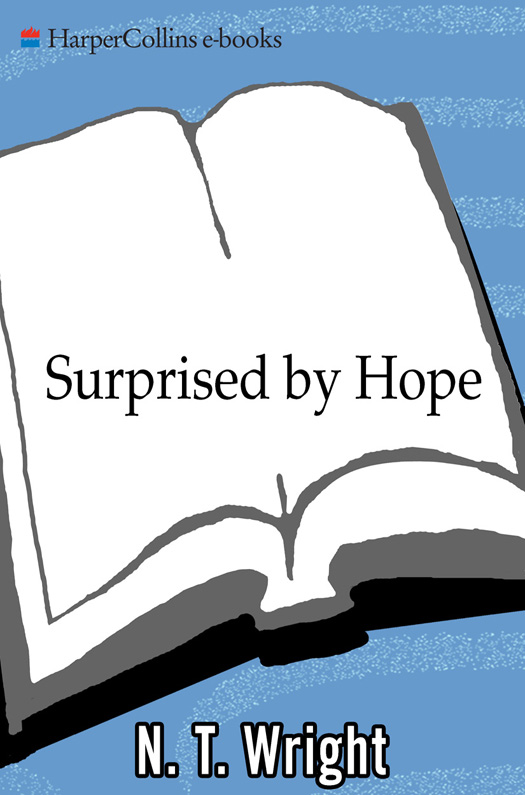What are we waiting for? And what are we going to do about it in the meantime?
Those two questions shape this book. First, it is about the ultimate future hope held out in the Christian gospel: the hope, that is, for salvation, resurrection, eternal life, and the cluster of other things that go with them. Second, it is about the discovery of hope within the present world: about the practical ways in which hope can come alive for communities and individuals who for whatever reason may lack it. And it is about the ways in which embracing the first can and should generate and sustain the second.
Most people, in my experienceincluding many Christiansdont know what the ultimate Christian hope really is. Most peopleagain, sadly, including many Christiansdont expect Christians to have much to say about hope within the present world. Most people dont imagine that these two could have anything to do with each other. Hence the title of the book: hope comes as a surprise, at several levels at once.
At the first level, the book is obviously about death and about what can be said from a Christian perspective about what lies beyond it. I am not going to attempt a physical or medical analysis of death and its aftermath or a psychological or anthropological description of beliefs and practices having to do with death. There are plenty of books about such things. Rather, I approach the question as a biblical theologian, drawing on other disciplines but hoping to supply what they usually lack and what I believe the church needs to recapture: the classic Christian answer to the question of death and beyond, which these days is not so much disbelieved (in world and church alike) as simply not known. A survey of beliefs about life after death conducted in Britain in 1995 indicated that though most people believed in some kind of continuing life, only a tiny minority, even among churchgoers, believed in the classic Christian position, that of a future bodily resurrection. Indeed, I often find that though Christians still use the word resurrection, they treat it as a synonym for life after death or going to heaven and that, when pressed, they often share the confusion of the wider world on the subject. And some Christian writers on the subject of death manage to marginalize resurrection and all that goes with it without apparently supposing that any great harm is thereby done.
I should say, as a kind of disclaimer, that at one level I am not well qualified to speak on the subject of death. Now in my late fifties, I am the least bereaved middle-aged person I know. My life has been remarkably free from tragedy; almost all my relatives have lived to a good age. I am surprised and grateful for this, and I certainly dont take it for granted. Moreover, though I have been ordained for over thirty years, the fact that my vocation has led me into universities, on the one hand, and into cathedral and diocesan work, on the other, means that I have conducted fewer funerals and memorial services than most clergy manage in their first two or three years. Seldom have I stood at a deathbed. But, whereas I obviously have a lot to learn firsthand about all these matters, I think I have made up for it by soaking myself, in a way that many dont have the chance to do, in the life and thought of the early Christians.with the hope that ought to energize our work for Gods kingdom in the present world.
At the second level, then, the book is about the groundwork of practical and even political theologyof, that is, Christian reflection on the nature of the task we face as we seek to bring Gods kingdom to bear on the real and painful world in which we live. (I apologize to librarians that this may cause confusion: is the book to be cataloged with eschatologydeath, judgment, heaven, and hellor politics?) Here too a disclaimer is in order. I am not a politician, though it is true that by virtue of my office I am a member of the British House of Lords. I have neither run for public office nor campaigned activelyin terms of the sheer hard work of speaking, writing, marching, cajolingfor many of the causes in which I believe. I have tried to put my shoulder to the wheel by other means. But the subjects in which I have specialized, and the pastoral situations I now face every day in a diocese several parts of which suffer severely from the faceless cruelties of the last fifty years, have forced me to think through some of what a Christian should be saying and thinking about rediscovering hope in the public and political world. As I have done so, I have found these two themes of hope, again and again, joining themselves together. I freely hand to potential critics these two disclaimers, my inexperience in both grief and politics and my hope that nevertheless the surprise of the Christian hope in both areas will reenergize and refresh those who work, more than I have been able to do, with both the dying and the dispossessed.
One more general word of introduction. All language about the future, as any economist or politician will tell you, is simply a set of signposts pointing into a fog. We see through a glass darkly, says St. Paul as he peers toward what lies ahead. All our language about future states of the world and of ourselves consists of complex pictures that may or may not correspond very well to the ultimate reality. But that doesnt mean its anybodys guess or that every opinion is as good as every other one. Andsupposing someone came forward out of the fog to meet us? That, of course, is the central though often ignored Christian belief.
This book grew out of lectures that were originally given in Westminster Abbey during the course of 2001. Some of these were reworked as the Stephenson Lectures in Sheffield, England, in spring 2003; some were given in Holy Trinity Church, Guildford, also in spring 2003; some were reworked again into the Didsbury Lectures at the Nazarene College in Manchester in October 2005; others found their way into church study days in St. Andrews Church, Charleston, South Carolina, in January 2005; in St. Marks Episcopal Church, Jacksonville, Florida, in March 2005; in City Church, Newcastle, England, also in 2005; in St. Marks Theological Centre, Canberra, Australia, in April 2006; in a consortium of churches in Roanoke, Virginia, in March 2007, and (in the form of the Faraday Lecture) in Cambridge in May 2007. I am extremely grateful to all those who invited, welcomed, and hosted me on all these occasions and particularly to those who by their questions and acute comments helped me think through the issues further and avoid at least some mistakes. I am grateful to the Ship of Fools Web site for commissioning the piece included at the end and for permission to republish a lightly emended version of it here. My thanks too to Dr. Nick Perrin, who during his time at Westminster Abbey worked over the text as it then was and made all kinds of helpful suggestions. And my thanks, as ever and always, to Simon Kingston, Joanna Moriarty, and the energetic and watchful staff at SPCK, and their counterparts, not least Mickey Maudlin, at HarperOne.
N. T. Wright
Auckland Castle
Feast of the Ascension 2007

